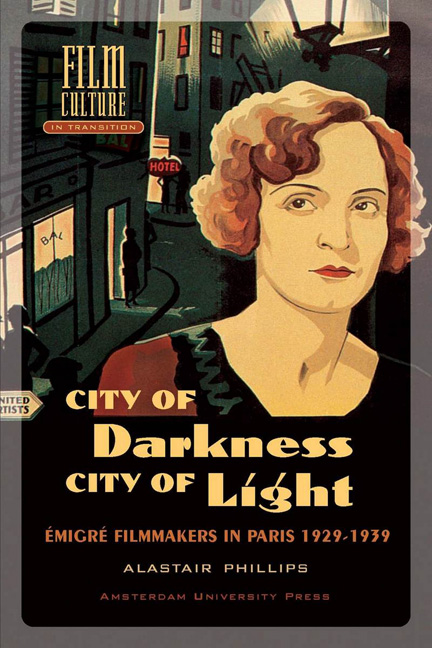Book contents
- Frontmmatter
- Contents
- Acknowledgements
- Chapter One Introduction
- Chapter Two The City in Context: An Historical Ambivalence
- Chapter Three City of Light: Paris as Spectacle
- Chapter Four City of Darkness: The Camera Goes Down the Streets: ‘The Hidden Spirit Under the Familiar Façade’
- Chapter Five Divided City: The Divided City in Context
- Chapter Six Conclusion
- Notes
- Appendices
- Filmography
- Bibliography
- Index
- Film Culture in Transition General Editor: Thomas Elsaesser
Chapter Three - City of Light: Paris as Spectacle
Published online by Cambridge University Press: 25 January 2021
- Frontmmatter
- Contents
- Acknowledgements
- Chapter One Introduction
- Chapter Two The City in Context: An Historical Ambivalence
- Chapter Three City of Light: Paris as Spectacle
- Chapter Four City of Darkness: The Camera Goes Down the Streets: ‘The Hidden Spirit Under the Familiar Façade’
- Chapter Five Divided City: The Divided City in Context
- Chapter Six Conclusion
- Notes
- Appendices
- Filmography
- Bibliography
- Index
- Film Culture in Transition General Editor: Thomas Elsaesser
Summary
“The Avenue de l’Opéra inundated with electric light; rue Quatre Septembre shining with a thousand gas jets (…) a crowd coming and going under a shower of rosy and whitest light diffused from great ground-glass globes (…) that mass of gleaming streets which lead to the Théatre Français, to the Tuileries, to the Concorde and Champs-Elysées, each one of which brings you a voice of the great Paris festival, calling and attracting you on seven sides, like the stately entrances of seven enchanted palaces, kindling in your brain and veins the madness of pleasure”
(E. de Amicis in Clark 1996, 76).This delirious quotation was, unsurprisingly, not authored by one of the émigrés from the German film industry who arrived in “the City of Light” in the early 1930s – it comes from the pen of a male visitor in the 1870s – but the phrasing does suggest a number of issues that concern the relationship between various émigré films set in Paris and the mythical status of Paris. Firstly, it introduces the notion of spectacle which was as appropriate for a visitor as it was for a native resident. According to T. J. Clark (1996, 63), the term “spectacle” pointed “to the way in which the city – and social life in general – was presented as a unity in the later nineteenth century, as a separate something made to be looked at – an image, a pantomime, a panorama”. How did the émigrés, as temporary residents of Paris, refer to this “highly coded” (Clark, 63) aspect in their own cinematic representations of the capital? In what ways did this suggestive condensation of looking and performance lead to the related issue of pleasure and entertainment? Despite Robert Siodmak's pronouncement that he hated “operetta and vaudeville because they represent hollowness, flashiness, and artificiality”, he directed two musical films during his time in Paris. These two films relied substantially on a fascinating integration of prominent cinematic techniques and popular French theatrical form. What exactly was the relationship of these émigré films to the pre-existing live city entertainment which de Amicis makes such an intense allusion to?
- Type
- Chapter
- Information
- City of Darkness, City of LightÉmigré Filmmakers in Paris 1929–1939, pp. 73 - 106Publisher: Amsterdam University PressPrint publication year: 2003



